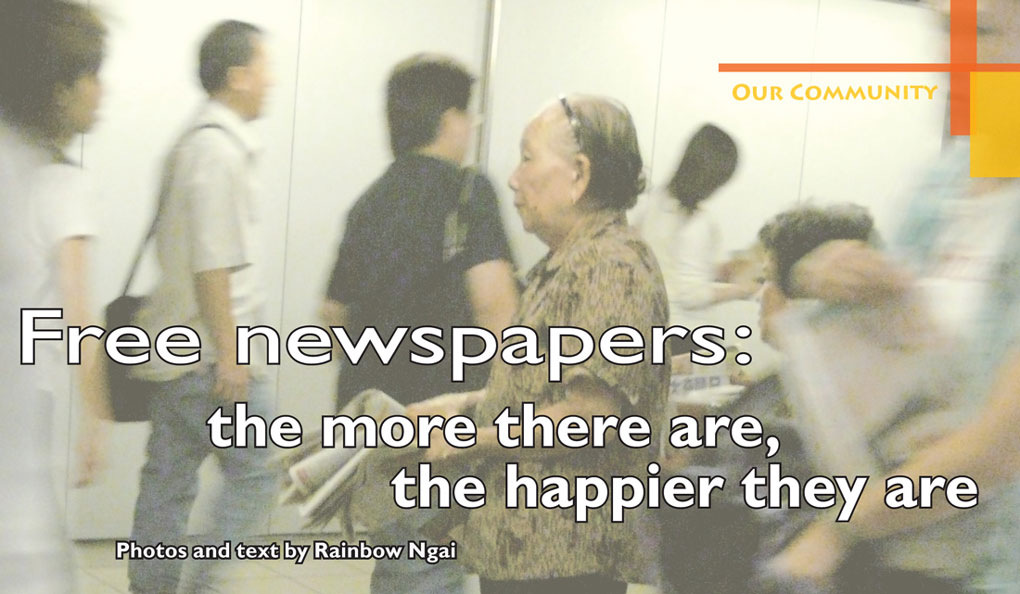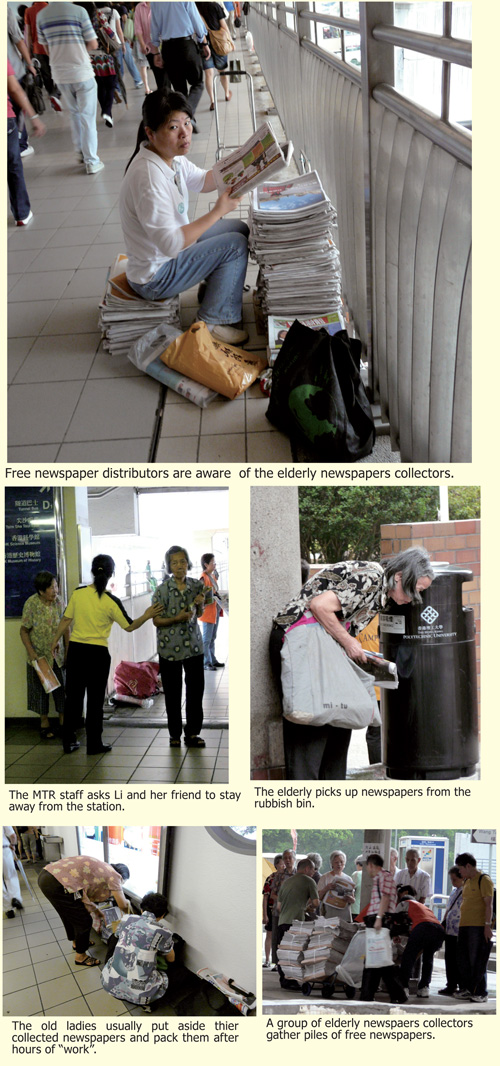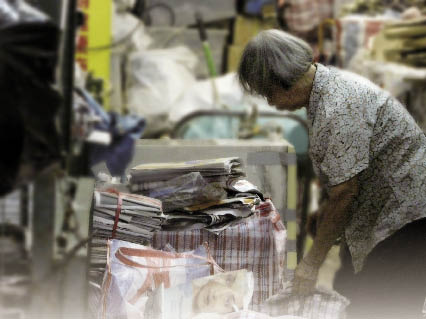
 |
Free newspapers are popular with the elderly in Hong Kong who gather in busy streets in the early morning, asking for used copies from passers-by or at the papers' distribution points. They do not want to know the latest news, but for the little money they earn by selling the newspapers to recycling companies.
Standing in the morning rush- hour-crowds at Mass Transit Railway (MTR) stations, scores of elderly people eagerly wait for every opportunity to seize copies of free newspapers from passers-by.
Most do not utter a single word, but stand quietly, stare at passersby, and beckon them to give them the papers.
With a large grey bag on her shoulders, one of the old ladies, surnamed Li, has been collecting free newspapers for around seven months.
Speaking in a mixture of Cantonese and her native Zhaoqing dialect, Li would hardly talk to Varsity as she was busy collecting papers around exit A of Hung Hom MTR station.
This lady began her daily routine by about 7 a.m. at a nearby footbridge before moving to the MTR station and then to the Hong Kong Polytechnic University (PolyU). On her way to the university, Li continually asked people for their newspapers. Passersby like Jeffery Cheng, a second-year PolyU student gave his paper to the old ladies, including Li, who gestured toward him.
At the university, Li immediately started scavenging around garbage bins on the campus for unwanted newspapers. Li's own diligent efforts and that of her elderly colleagues, net them at least ten full bags of newspapers each morning.
This group of elderly collectors are rarely content with the supply provided by passers-by. The major distribution points of the free newspapers are their main targets for paper collection.
In the early morning, elderly people line up near Wong Tai Sin MTR station as they were told by the distributors of the free papers to collect the papers in an orderly queue.
Fung Tung-chi, 65, a retired man living nearby, comes to line up for the free newspapers every morning.
"I'm not a professional," laughed Mr Fung. By trading these newspapers to the recycle company each month, Mr Fung said he could only earn no more than 30 dollars, which is very little compared to other "professional" collectors he knew.
According to Mr Fung, the "professionals" can earn about $80 as they not only collect free newspapers, but also other paper products, such as company prospectuses, waste cardboards and old books.
Yet, Mr Fung is still satisfied with his lot and says that he usually spends the money he earns drinking tea at a Chinese restaurant. This amount of money may not be a big deal in our eyes, but the elderly treat it as a bonus. "We can buy other things with the money as we have the time to queue for cheaper things," Mr Fung said.
These newspaper collectors not only stand near the newspaper distribution points outside MTR stations, some of them also go into the actual MTR station and enlist others to help them get copies of the free newspapers.
Another elderly collector, surnamed Choi, who visits the free newspapers' distribution point every morning, said she considers collecting papers as morning exercise, just like exercising in the park.
Though she refused to tell how much she earned every day, she said that the amount of money is good enough.
However, some distributors of free newspapers are not pleased with the army of newspaper collectors. Fong, a free newspaper distributor outside Hung Hom MTR station who refused to disclose her full name, complained that these elderly people often got in her way when she works.
"To put this in the most direct manner, this place is like an ocean and these people are acting as if they are scavenger fishes, following us around and feeding on our resources," said Fong.
Sometimes the newspaper distributors asks the elderly people to stay away from the distribution points. They would also forcefully retrieve the extra copies that the elderly had taken from them.
Though there are no clear guidelines restricting the number of copies each person can receive, Fong thinks it is reasonably and socially accepted that each person only gets one copy.
Frustrated by the elderly collectors, Fong and her colleagues are always on the look out for people who carry voluminous shoulder bags.
"It's easy to identify them. Whoever wander around with shoulder bags, like those recyclable bags, are people who collect newspapers," said Fong.
Mei, another free newspaper distributor, said: "I'm so jealous of them. They have more newspapers than I do." She teasingly said that these elderly collectors often have many more newspaper since they are able to collect newspapers from more than one distribution point. She estimated that each of them can collect at least 350 newspapers per day.
Some distributors ask passersby not to hand the papers to the elderly people. Chung Po-po, a 40-year-old housewife said: "I was scolded by the distributor very loudly at the MTR station. That's so embarrassing!"
 The elderly collect bags of newspapers and then sell to the recycle companies every month. |
The distributor asked Chung not to give them any newspapers again as the elderly took the papers not for reading, but for selling. In spite of this, Chung said she would keep on helping the elderly by giving them her newspapers.
Meanwhile, some distributors are sympathetic to the elderly collectors. Ah Wai, a distributor asks the elderly people to line up for the papers. He said: "I don't want them to fall down when trying to get the papers. Their bones are fragile. If anything happens to them, it may cause them a long time to heal."
Tam Wai-kit, an environmental specialist and co-owner of a recycling plant, EcoSage, said double increase of the price of paper recently from HK$0.70 per kilogram to HK$1.40 per kilogram is one incentive for the elderly to collect the papers.
"60 to 70 per cent of the materials we recycle are paper," said Mr Tam. "And around 20 per cent of that is free newspapers."
According to Mr Tam, most newspapers they get are provided by the elderly during weekday mornings when free papers are distributed.
However, Mr Tam still regards free newspapers as being environmentally unfriendly.
"If the elderly collectors read the newspapers before selling them to us, they are not directly harming the environment, assuming that the papers are recycled properly," said Mr Tam. "But if people don't necessarily read the newspaper and take a copy just because it's there, then I don't think they are environmentally friendly."
A Green Peace Hong Kong campaigner, Ivy Chan Siu-ping, said the 1.4 million copies of the four free newspapers published every day are only the tip of the iceberg of Hong Kong's environmental problems.
"There are environmental issues in the production of print media, whether it is free or not," said Miss Chan.
She said 310,000 tonnes of traditional newspapers were produced in 2007 with non-environmentally friendly materials.
"Hong Kong gives no priority to recycled fibre at the moment so the government should encourage the print media to use recycled fibre in their publications," she said.
Varsity approached the publishers of the Metropolis Daily and Headline Daily to comment on these newspaper collectors and the use of recycled fibre in newspaper production. They are yet to give a reply. 